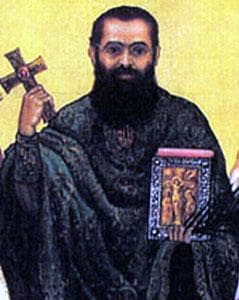
Blessed Kamen Vitchev
Blessed
Feast Day: November 13
Birth: May 23, 1893
Death: November 1, 11
Biography
Blessed Kamen Vitchev, also known as Peter Vitchev, was born on 23 May 1893 in Strem, in the diocese of Tracia, Burgas region, Bulgaria. He was raised in a devout and orthodox Eastern Rite family and received his early education in Strem. Later, he continued his studies in Adrianopolis (modern Edirne, Turkey).
On 8 September 1910, Peter joined the Congregation of the Assumption in Gemp, taking the religious name Kamen. He dedicated himself wholeheartedly to the mission of the congregation and soon became a prominent figure within it.
In 1918, Kamen became a professor at the College of Saint Augustine in Plovdiv, Bulgaria. His passion for education led him to become a teacher at the Little Seminary of Koum Kapou in Istanbul, Turkey, where he influenced and mentored many young seminarians. In 1920, he became a professor of theology in Kadiköy, Turkey. Finally, on 22 December 1921, he was ordained in the Eastern Rite, embracing the priesthood.
Kamen's thirst for knowledge and theological studies led him to Rome, Italy, and Strasbourg, France, where he pursued further education. In 1929, he obtained his doctorate in theology, solidifying his academic background. Returning to the College of Saint Augustine in Plovdiv in 1930, he served as a dedicated teacher, college rector, dean of studies, and lecturer in philosophy. With his strict approach, he set high academic standards for his students, who highly respected him.
Aside from his teaching duties, Blessed Kamen Vitchev was an active writer and intellectual. He contributed to several magazines, often using pen names, and focused on bridging the gap between science and religion. His writings delved into various matters related to faith and reason, demonstrating his commitment to exploring the intersection of theology and scientific inquiry.
However, the outbreak of communism in Bulgaria brought significant challenges and persecution for the Catholic Church. On 2 August 1948, the College of Saint Augustine was closed by the Communist regime, and Father Kamen was appointed as the superior of the seminary in Plovdiv. Later that year, when all foreign religious were expelled from the country, Kamen was chosen as the Provincial Vicar of the Bulgarian Assumptionists, taking on a leadership role in difficult times.
The government's hostility towards the Catholic Church intensified, resulting in Kamen's arrest on 4 July 1952, on false charges of anti-state activities due to his priesthood. He was accused of leading a Catholic conspiracy against the Communist regime. Despite being put on trial, it was clear that his only crime was adhering to his vocations as both a Catholic priest and an educator.
Tragically, on the night of 11 November 1952, Blessed Kamen Vitchev was executed by a Bulgarian Communist firing squad at 11:30 pm. His martyrdom was a testament to his unwavering faith and commitment to his priesthood, and he became an inspiration to many faithful Catholics in Bulgaria and beyond.
After his death, his reputation for holiness grew, and on 23 April 2002, Pope John Paul II declared him venerable, recognizing his heroic virtues. Just over a month later, on 26 May 2002, Pope John Paul II beatified Blessed Kamen Vitchev in a solemn ceremony held in Plovdiv, Bulgaria, affirming his sanctity and acknowledging his sacrifice.
Today, as a blessed, Blessed Kamen Vitchev is honored and celebrated on his feast day, which falls on 13 November each year. His life and martyrdom serve as a reminder of the courage, devotion, and unwavering faith of those who fiercely defended the Catholic Church during times of persecution.